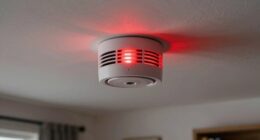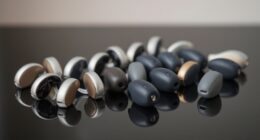While exploring the realm of hearing aids, we often come across many benefits that enhance our ability to hear.
However, have you ever pondered the lesser-known aspects that might disrupt this harmony?
From the subtle nuisances like headaches and itchiness to the more pronounced issues such as feedback noises and tinnitus, the side effects of hearing aids can sometimes be overlooked.
Stay tuned as we unravel the complexities surrounding these potential challenges and unveil strategies to address them effectively.
Key Takeaways
- Hearing aid adjustments can alleviate tinnitus triggers.
- Proper fitting reduces skin irritations and soreness risks.
- Itchiness managed with specialist guidance and moisturization.
- Professional assistance crucial for resolving sound quality and feedback issues.
Headaches and Tinnitus
Experiencing headaches and tinnitus when using hearing aids isn't uncommon as the brain adapts to amplified sounds and settings. Headaches may arise as the brain processes new auditory inputs, especially if the hearing aid settings aren't yet optimized. Similarly, tinnitus, characterized by buzzing or whirring noises, can be triggered by certain hearing aid configurations.
An audiologist can play a pivotal role in alleviating tinnitus symptoms related to hearing aids by adjusting the device settings to better suit the individual's needs. During the initial use of hearing aids, the brain undergoes readjustment to sounds, which may manifest as tinnitus-like experiences. Seeking guidance from an audiologist can help in addressing tinnitus issues associated with the use of hearing aids promptly and effectively.
It's crucial to monitor these symptoms closely and consult with professionals to ensure a comfortable and beneficial hearing aid experience.
Skin Irritations and Soreness

Skin irritations and soreness associated with hearing aid use can stem from poorly fitting devices and prolonged wear, necessitating professional attention for prevention and resolution. When hearing aids don't fit correctly, they can rub against the skin causing irritation and discomfort. This irritation may lead to soreness, redness, or even the development of sores on the skin. Additionally, wearing hearing aids for extended periods without proper adjustment can result in an itchy ear canal, further exacerbating the discomfort.
To avoid skin issues related to hearing aids, it's crucial to seek a specialist fitting. A professional can ensure that the devices fit securely and comfortably, reducing the risk of skin irritation and soreness. Consulting with a specialist not only enhances comfort but also promotes overall skin health. By taking proactive steps to address poorly fitting devices and seeking expert advice, individuals can prevent and alleviate skin irritations associated with hearing aids.
Itchy Ear Canal
An itchy ear canal may result from wearing hearing aids and can be managed through proper moisturization and expert guidance on ear hygiene. When individuals use hearing aids, the inner ear may become more sensitive, leading to itchiness or skin irritation.
To address this discomfort, it's essential to keep the ear canal moisturized. However, it's crucial to avoid scratching the inner ear to prevent further irritation. Proper ear hygiene practices, such as gentle cleaning and drying of the ears, can help manage itchiness associated with hearing aid use.
Consulting with a specialist can provide valuable insights into managing itchiness effectively. By following recommendations for moisturizing and maintaining proper ear hygiene, individuals can alleviate itchiness in the ear canal and prevent potential skin issues. Remember, taking care of your ears is essential for a comfortable experience with hearing aids.
Sound Issues

Improperly adjusted hearing aids can result in various sound issues, such as strange noises or incorrect volume levels, potentially indicating the need for professional adjustments by an audiologist. When the settings are off, sounds may appear distorted, leading to discomfort and an impact on overall sound quality.
Tinnitus, buzzing, or noises seeming louder than usual are common signs that adjustments are needed. Additionally, crackling and hissing noises, often associated with feedback, can be a result of improper settings.
During the adjustment period, it's crucial to communicate any sound issues experienced to ensure optimal hearing aid performance. Properly set up hearing aids not only enhance sound quality but also prevent distractions caused by feedback noises.
Seeking professional assistance to fine-tune your device can significantly improve your quality of hearing and overall satisfaction with your hearing aids.
Feedback and Interference
Experiencing feedback noises like wind rushing, static, or crackling from your hearing aids may indicate a need for adjustments by an audiologist to ensure optimal performance. These disruptive sounds, known as feedback, can occur when the hearing aid picks up and reamplifies its output sound. Feedback noises are considered side effects of hearing aids and can interfere with the overall hearing experience.
While some minor feedback may be normal, consistent or loud feedback indicates a problem that requires attention. Audiologists are trained to address such interference by making adjustments to the hearing aid settings. Properly set up hearing aids shouldn't produce feedback noises during regular use.
If you're encountering persistent feedback, seeking consultation with an audiologist is essential to resolve the issue. By addressing feedback and interference promptly through adjustments, individuals can enjoy the full benefits of their hearing aids without disruptions.
Frequently Asked Questions
What Are the Side Effects of Wearing Hearing Aids?
Sure, we can discuss the side effects of wearing hearing aids.
Increased earwax build-up, skin irritation, crackling noises, feedback, and interference issues are common challenges.
Maintenance is crucial for optimal performance.
How Does a Hearing Impairment Affect You Emotionally?
Hearing impairment emotionally impacts us by causing feelings of isolation, frustration, and reduced confidence in social situations. Anxiety and depression are common responses to hearing loss, affecting our overall well-being.
Seeking support from loved ones and professionals can help manage these challenges effectively. It's crucial to address the emotional toll of hearing impairment to maintain a healthy and fulfilling lifestyle.
Can Hearing Aids Make You Feel Ill?
Yes, hearing aids can make you feel ill, especially during the adjustment period. Symptoms like headaches or dizziness may arise as your brain adapts to new sounds.
It's crucial to consult a specialist to address any discomfort. Properly fitted aids and gradual wear can minimize these feelings.
If any illness-like symptoms persist, seek evaluation from a healthcare provider for further assistance.
What Happens to Your Brain When You Wear Hearing Aids?
When we wear hearing aids, our brains embark on a remarkable journey. Just like a gardener tending to a flourishing garden, our brains cultivate new neural pathways, adapting to the enriched auditory landscape.
With time, the brain becomes a master conductor, orchestrating sounds with precision. This symphony of adaptation enhances speech clarity and amplifies our world.
The brain's plasticity ensures that with consistent use, our auditory experiences blossom, enriching our lives.
Conclusion
In conclusion, while hearing aids can have some side effects, proper fitting and maintenance can help alleviate discomfort. Despite potential challenges, the benefits of improved hearing far outweigh these temporary issues.
Some may argue that the adjustment period is too difficult, but with the support of audiologists and patience, the rewards of clearer communication and enhanced quality of life make the journey worthwhile.
Trust the process and embrace the positive changes that hearing aids can bring.











